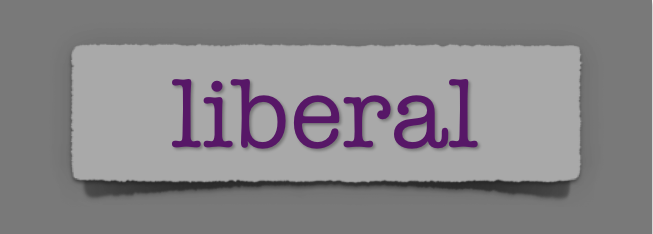Liberal.
It’s a word that most certainly elicits a response. In the media, it’s a lightning rod. In the dictionary, it means generous and open-minded. I’ve been thinking about the word for a couple of days now after having read an article about a professor at my alma mater who was calling for those in the Cooperative Baptist Fellowship (CBF) who called themselves “moderate” to admit they were “liberal”—and not in a good way.
For those of you who don’t know your recent Baptist history, the CBF began when the Southern Baptist Convention fractured in a political/theological struggle that began while I was in seminary. The divisions were as deep as the wounds, and both have continued down the years, alongside some healing as well. The CBF did not set out to be another denomination, and so a broad range of churches have been connected, particularly around mission endeavors, which means the theological spectrum among them is fairly diverse. In discussing his concerns about that diversity the professor said,
However, I am a conservative among the moderates in the CBF and urge those moderate Baptists who are really liberal, in the historical sense, to drop the label moderate and just call themselves liberals. When they agree with Marcus Borg’s theology, for example, they are liberal, not moderate.
The last sentence is the one that got me because Marcus Borg, who recently died, has been on of the people who has feed my life of faith. I remember reading Meeting Jesus Again for the First Time and thinking the difference between us was where we grew up and what questions we were taught to ask. More than anything else, I came away with a sense of resonance. I trusted him as he professed his faith, even when it was not in the way I professed mine. The second book of his I read was The Heart of Christianity, which remains one of my favorite books, period. In it he talked about the church in North America having both an existing paradigm and an emerging paradigm. He was clear to say from the beginning that he was not trying to create a dichotomy as much as describe these two genuine expressions of faith as it gets lived out in the church existing alongside of each other.
When Ginger and I found our way to the UCC, we felt at home. The congregational church polity was a structure we understood and appreciated and it was coupled with a faith that trusted that “God was still speaking,” leaning back to the words of some of the first American Christians who believed in all that had been handed down and that “there was more light yet to break forth.”
One of my friends describes the UCC by saying, “If Christianity were a neighborhood, we’d be the last house on the left.” The liberals. The progressives. The people of extravagant welcome. It’s a good house in a good neighborhood.
The article left me feeling as though the professor saw liberal Christianity as a watered down version of the Real Thing, that those who had liberal leanings needed to admit they weren’t really the church. For me, being liberal means taking equality and inclusiveness seriously, making sure that all God’s people know they are wanted, in the same way that Jesus called us to love our neighbors as ourselves. Being liberal means understanding the heart of the gospel has to do with how we treat the poor and marginalized in our society. That’s right: the gospel is about social justice, in the same way Jesus said he had come to proclaim liberty to the captives. In the history of the denominations that now make up the UCC, we ordained an African-American man to pastor a predominantly white congregation before the Civil War, began ordaining women to ministry sixty years before they could vote, and ordained the first openly gay pastor in 1970. Liberal Christians have done much to further the gospel of Christ in our world, alongside of brothers and sisters up and down the theological continuum.
We have much to learn from each other. We are called to be in this together. We do our best work when we look for resonance rather than lean into labels. Yes, we have our differences, but let us choose not to let those define us and lead with invitations rather than instructions.
in Christ there is no East or West,
in him no South or North,
but one great fellowship of love
throughout the whole wide earth
Peace,
Milton

Amen. Anon shal we receive the morning offering.
Thank you for the UCC history. Can you teach a course in that?
I found the last paragraph here really powerful. Thanks, Milton.
Resoundingly good!! Thank you!
My church has the subtitle: “an ecumenical liberal Baptist congregation”. Not all the members are political liberals (most of us are, I think, but that isn’t an issue), but all are open-minded and seek social justice and peace.
We came up with that tag line when the time came to erect a sign in front of our new church building, and thought “the B word” might scare off the very people who could be at home in our congergation. the “ecumenical” and “liberal” make passers-by stop and think a minute.
You write so articulately. I am really appreciating your Lenten blogs this year. Thanks.
this is excellent. thanks, man . . .
Thank you Milton. Once again you have voiced my thought and beliefs. It is good for me to hear that others believe as I do. So, again, Thank You.
This is a powerful blog with which I feel kinship.